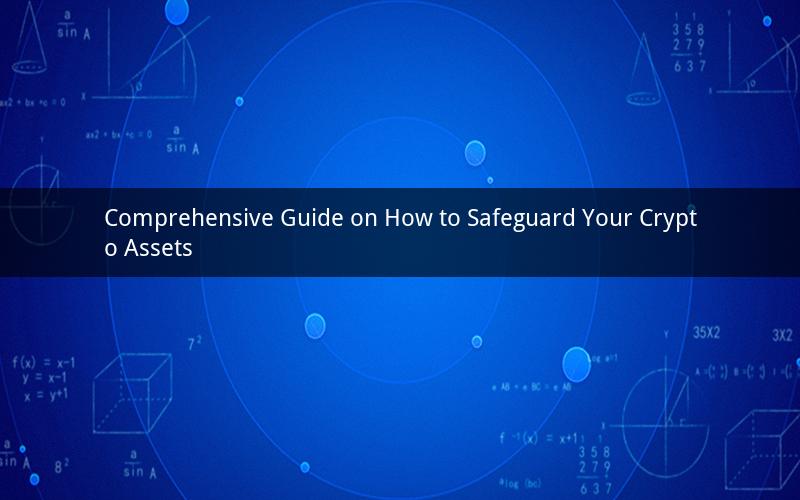
Introduction:
In the rapidly evolving world of cryptocurrencies, protecting your digital assets has become more crucial than ever. As the value of digital currencies continues to soar, so does the risk of theft and fraud. This guide will delve into the essential steps and best practices to ensure the security of your crypto assets.
1. Understanding the Importance of Security:
Before diving into the practical aspects of protecting your crypto assets, it is vital to understand why security is of utmost importance. Cybercriminals are constantly on the lookout for vulnerabilities in cryptocurrency wallets and exchanges, making it essential to take proactive measures to safeguard your investments.
2. Choosing a Secure Wallet:
One of the first steps in protecting your crypto assets is selecting a secure wallet. There are two main types of wallets: hot wallets and cold wallets. Hot wallets are connected to the internet and offer convenience but come with higher security risks. Cold wallets, on the other hand, are offline and provide enhanced security but may be less user-friendly.
3. Cold Wallets: The Safest Option
Cold wallets, such as hardware wallets and paper wallets, are considered the safest option for storing large amounts of cryptocurrencies. Hardware wallets are physical devices that store your private keys offline, making them immune to online threats. Paper wallets, on the other hand, involve printing your private keys and public addresses on a piece of paper. While they offer excellent security, they can be easily damaged or lost.
4. Using Multi-Factor Authentication (MFA):
Multi-factor authentication adds an extra layer of security to your crypto assets. By requiring multiple forms of verification, such as a password, a code sent to your phone, or a biometric scan, MFA significantly reduces the risk of unauthorized access. Enable MFA on all your cryptocurrency accounts, including wallets and exchanges.
5. Staying Informed about Phishing Attacks:
Phishing attacks are one of the most common methods used by cybercriminals to steal crypto assets. Stay informed about the latest phishing techniques and be cautious of emails, messages, or calls asking for your private keys or other sensitive information. Always verify the legitimacy of any communication before providing any personal details.
6. Backup Your Wallets:
Regularly backing up your wallets is crucial for protecting your crypto assets. If your wallet gets lost, stolen, or damaged, a backup will allow you to recover your funds. Ensure that you store backups in multiple secure locations, such as different physical devices or encrypted cloud storage.
7. Keep Your Software Updated:
Software vulnerabilities can be exploited by cybercriminals to gain access to your crypto assets. Regularly update your computer, smartphone, and any other devices used for accessing your cryptocurrencies. Additionally, keep your wallet software up to date to ensure you have the latest security features.
8. Avoid Holding Large Amounts of Cryptocurrency in Exchanges:
Exchanges are prime targets for hackers, making it risky to store large amounts of cryptocurrencies on them. Whenever possible, transfer your assets to a secure wallet, such as a hardware wallet, as soon as you complete a transaction. This minimizes the risk of losing your funds due to a security breach on the exchange.
9. Use Strong and Unique Passwords:
Create strong and unique passwords for all your cryptocurrency accounts and wallets. Avoid using easily guessable information, such as birthdays or common words, and consider using a password manager to securely store and manage your passwords.
10. Educate Yourself about Cryptocurrency Scams:
Stay informed about the various types of cryptocurrency scams, such as Ponzi schemes, phishing attacks, and pump-and-dump schemes. Educate yourself on the red flags and be cautious of any investment opportunities that seem too good to be true.
11. Consider Using a Security Token
A security token is a digital asset that represents ownership or rights in a company or asset. By using a security token, you can protect your crypto assets by transferring them to a regulated and secure platform. This adds an extra layer of oversight and reduces the risk of fraud.
12. Engage in Regular Security Audits
Regularly perform security audits of your crypto assets and wallets. This involves reviewing your security practices, checking for any vulnerabilities, and ensuring that all measures are up to date. Consider hiring a professional to conduct a thorough audit and provide recommendations for improvement.
13. Stay Informed about Regulatory Changes
Cryptocurrency regulations are constantly evolving, and staying informed about the latest changes is crucial for protecting your assets. Keep an eye on regulatory developments in your country and consider the potential impact on your investments.
14. Share Your Knowledge with Others
As a responsible crypto asset owner, share your knowledge and best practices with others. Encourage friends, family, and colleagues to take proactive measures to protect their digital assets. By spreading awareness, you can contribute to a safer cryptocurrency ecosystem.
15. Remain Vigilant and Stay Informed
FAQs:
Q1: What is the most secure way to store my cryptocurrency?
A1: The most secure way to store your cryptocurrency is by using a hardware wallet, which stores your private keys offline and is resistant to online threats.
Q2: Can I use the same password for all my cryptocurrency accounts?
A2: No, it is crucial to use strong and unique passwords for each cryptocurrency account and wallet to prevent unauthorized access.
Q3: Are cold wallets more secure than hot wallets?
A3: Yes, cold wallets are generally more secure than hot wallets as they store your private keys offline, making them immune to online threats.
Q4: How can I protect myself from phishing attacks?
A4: Stay informed about the latest phishing techniques and be cautious of any communication asking for your private keys or sensitive information. Always verify the legitimacy of any communication before providing any personal details.
Q5: Should I regularly update my software to protect my crypto assets?
A5: Yes, regularly updating your computer, smartphone, and wallet software is crucial to ensure you have the latest security features and protect your crypto assets from vulnerabilities.